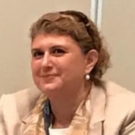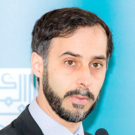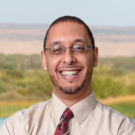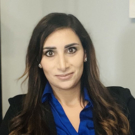Speakers

Carol Chouchani Cherfane
Director, Arab Centre for Climate Change Policies; Cluster Leader, Climate Change and Natural Resource Sustainability Cluster, United Nations Economic and Social Commission for Western Asia

Laurent A. Lambert
Water-Energy-Climate Public Policy Assistant Professor, Doha Institute for Graduate Studies; Enseignant-Chercheur, Sciences Po Paris

Mohammed Mahmoud
Senior Fellow and Director of the Climate and Water Program, Middle East Institute

Jeannie Sowers
Professor and Chair, Department of Political Science, University of New Hampshire
Moderator
About the Webinar
On April 28, Arab Center Washington DC (ACW) held a webinar titled “The Impact of Climate Change and Environmental Injustice in the Middle East and North Africa: What Should be Done?” Panelists were Carol Chouchani Cherfane, Director, Arab Centre for Climate Change Policies and Cluster Leader, Climate Change and Natural Resource Sustainability, United Nations Economic and Social Commission for Western Asia (ESCWA); Laurent A. Lambert, Water-Energy-Climate Public Policy Assistant Professor, Doha Institute for Graduate Studies and Teacher-Researcher at Sciences Po Paris; Mohammed Mahmoud, Senior Fellow and Director of the Climate and Water Program, Middle East Institute; and Jeannie Sowers, Professor and Chair, Department of Political Science, University of New Hampshire. ACW Deputy Executive Director Tamara Kharroub moderated the event.
Carol Chouchani Cherfane said that ESCWA has been engaged in the Middle East and North Africa region on different aspects of the climate change issue but found that it cannot be looked at solely as an environmental issue but a whole of society, whole of government, and whole of economy issue. She said that today there is a problem with water availability in the region and with conflicts and refugees (2 of every 5 refugees in the world are in MENA). But, she added, the debt crisis of governments and people cannot be ignored because it affects both mitigation of the climate crisis and adaptation of methods to deal with it. Looking at the overall environmental situation, Cherfane said that there is a danger that the temperature of the MENA region could rise by another 5 °C by 2100 which would be very dangerous to human life and food production. She said that what is beginning to happen are increased disasters that are occurring more often and more severely in more areas. She stressed that vulnerabilities resulting from climate change are affecting issues of access and equity in most societies which means that mitigation and adaptation strategies are more necessary than ever. She added that “resilience is not just a one-time tack where we provide humanitarian assistance once to respond to this disaster, but it has to be put in the context of the communities that no longer have the resources…to adapt over the long term.” Cherfane ended her presentation by saying that what is hoped for is that the Arab region can limit its temperature increase to only 1.5-2 °C by the end of the 21st century and that more financing is available for Arab countries.
Laurent Lambert discussed the findings of the United Nations Intergovernmental Panel on Climate Change, starting with the statement that there no longer any doubt that climate change is the result of human activity and that human behavior is the driver of higher temperature. There are heat waves, hot extremes, heavy precipitation, cyclones, agricultural and ecological droughts, and other environmental phenomena that can generally be blamed on such behavior. In other words, he said, states and societies should not disregard the situation because it will only get worse. He concurred with Cherfane’s conclusion that there should be efforts to limit temperature change to 1.5-2 °C. Lambert also discussed the effect of climate change on the rise in sea water levels and in oceanic water expansion that result in flooding of coastal communities. He highlighted what will happen in the future to such places as Shatt al-Arab in Iraq and to cities such as Doha, Abu Dhabi, and Dubai that are going to be inundated with 1.8 meters of salty sea water (some studies put the figure at 3 meters). This will mean, at least in the case of Iraq, the disappearance of very fertile agricultural land essential for food security. A related issue, he said, is land subsidence, which means that coastal land in the Gulf is sinking anywhere from 2 to 7 millimeters per year, and that is due to overuse of underground water resources. Lambert also discussed desertification in Iraq, Iran, and the Gulf Arab countries. Fresh water lakes are disappearing. Also marine life is becoming endangered which will be a problem for food security. He said “you don’t have to go far to see all the dying corals, which means that marine life is gradually dying.”
Mohammed Mahmoud reminded the audience that high temperatures in the MENA region are normal, but over the last few years the heat increased exponentially. Different cities in the region are showing temperatures of 50 °C, making people’s lives intolerable. He said that in the short to medium term, we are going to see more incidence of 50-60 °C in more areas of the region. He discussed the impact of this situation on public health where more heat-related illnesses will increase such as heat strokes. Even death will increase among those performing outside work (mostly migrant workers working in the Gulf). There will be more demand for energy and more impact on the physical infrastructure in the countries of the region such as roads and bridges, water desalination and treatment plants, power stations, etc. Mahmoud emphasized both economic and behavioral drivers of climate change, saying that states and societies have to alter the way they live. He stated that while rising water levels are going to be a serious problem, there will also be a heat multiplier effect such as increased humidity that has its own effect on human health and the physical environment. He highlighted the problems with agriculture along the eastern Mediterranean with wild-fires and lessened water availability. He also discussed the issue of cyclones resulting from rising ocean temperatures, detailing how Cyclone Shaheen wreaked havoc a few years ago. As for solutions, Mahmoud said that “adaptation and mitigation are two sides of a coin that need to be considered.” He also spoke of diversifying energy production such as renewable energy and increasing vegetation. Recycling and water reuse are also good strategies. He also called for mitigating against working during the hours of high heat in the Gulf.
Jeannie Sowers focused on environmental politics and said that there are inequitable conditions for dealing with climate change. She stated an irony that many areas of the MENA region are projected to be uninhabitable in the future, yet their inhabitants cannot leave them to go to other places. She highlighted a fact that governments may not be paying attention to and that is population growth that is left out but needs to be incorporated in the discussion. She said that important issues are those of women’s fertility, education, and health care and stressed that “until we bring women’s issues and gender issues into the development agenda, we can’t actually address adaptation and vulnerability questions the way we need to.” Women and children are directly and adversely affected by conflict. Speaking about women’s rights and thinking about population growth “need to be part of the discussion about the climate adaptation agenda.” She also discussed the vulnerability of people living in areas of surface water rivers to climate change as well as expatriate workers who have no say in how they can be protected from high temperatures. On this last issue, Sowers mentioned a Kuwaiti study that showed that the rate of laborers dying on an extremely hot day is three times the rate on normal heat days. But that is only for migrant workers, not Kuwaiti citizens. She said that this is a purely political choice, and we must ask about who is making these political arrangements that affect some people not participating in making them. She likened that to the impact of the COVID-19 pandemic on the expatriate workers who were affected more than others. In other words, she said, “those who often are on the periphery of these political economies are already facing the impact of climate change.”

